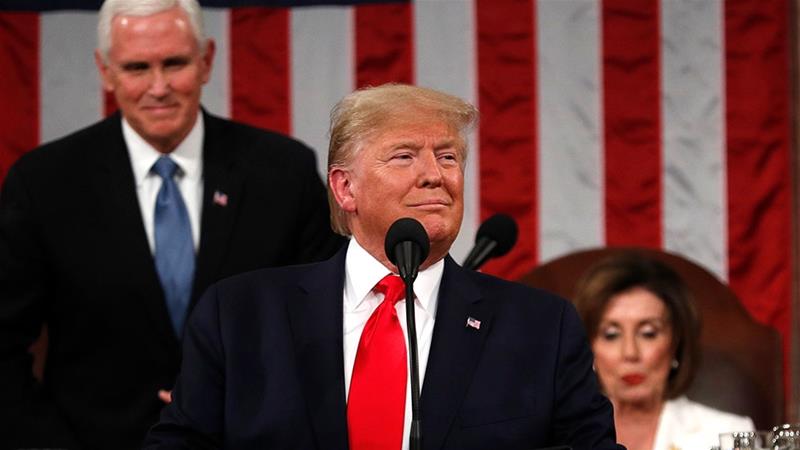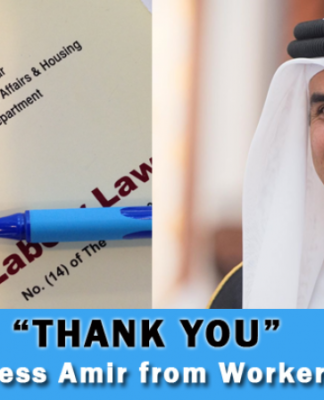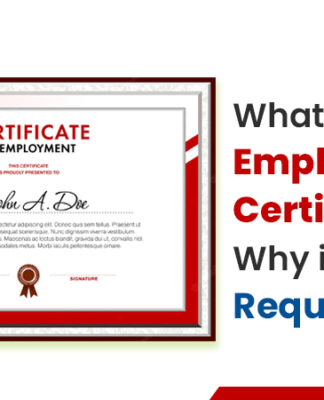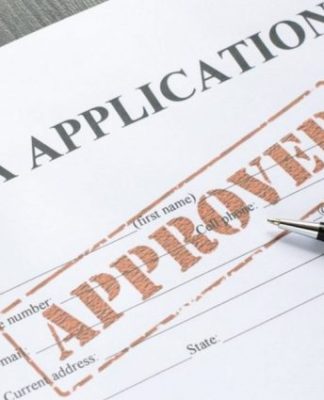Washington, DC – President Donald Trump is expected to hone in on issues such as job growth and the performance of the United States economy in Tuesday night’s State of the Union address, a political theme he hopes to ride to re-election in November.
Assured now by Republican allies of an expected acquittal in his Senate impeachment trial, the nationally televised speech is a chance for Trump to energise his re-election campaign by emphasising what he sees as the positives.
More:
Trump has frequently touted his stewardship of the US economy. As recently as two weeks ago, he claimed it was in “a rather dismal state” until he and his administration turned it into a “roaring geyser of opportunity”.
But the numbers do not support the “geyser” narrative. There are signs the record US economic expansion – now in its 11th year – is getting long in the tooth.
Job creation is slowing. And the US economy grew a modest 2.3 percent last year – well short of the 3 percent growth Trump had predicted following a $1.5 trillion tax cut package he and his fellow Republicans pushed through Congress in 2017.
But Trump continued to hype the economy on Sunday in an interview with Fox New’s Sean Hannity.
“With the economy being the best probably it’s ever been in our country – I mean, it is the best it’s ever been, the unemployment numbers are the best – I should be up by 25 points.”
“I don’t see how anybody can possibly beat me,” Trump said.
Trump’s trade war with China weighed on US manufacturing last year as businesses held back on investment. And while factory activity bounced back in January amid the signing of a phase-one trade deal between Washington and Beijing, US tariffs still remain in place on some $360bn of Chinese goods.
The coronavirus outbreak and the ongoing troubles for Boeing surrounding the 737 MAX could also present headwinds to growth, said Greg Valliere, chief US policy strategist at AGF Management, a money-management firm based in Toronto, Canada.
“There are signs the economy may not be as strong as Trump was counting on,” Valliere told Al Jazeera.
“It’s still a plus but the next GDP number in late April could be a soft number,” Valliere said, referring to the gross domestic product (GDP) which measures the value of all goods and services produced across the economy.
As a result, Trump is likely to tout a forthcoming tax cut proposal from White House economic adviser Larry Kudlow and may propose Congress take up legislation to boost infrastructure spending – which would stimulate the economy. He will also continue to push the US Federal Reserve Bank to lower interest rates if the economy slows, Valliere said.
Unpopular president
Notwithstanding the US economy, political analysts say Trump’s prospects for re-election in 2020 are narrow. Just as in 2016, many analysts believe Trump is not likely to win a majority of the popular vote. He would prevail by assembling an Electoral College victory through wins in key swing states.
Trump is all but assured vindication in the Democrats’ impeachment drive against him and he will use Tuesday’s speech to tout his foreign policy and domestic accomplishments that appeal to his base of supporters.
“We have known what this president has been doing from his Inauguration speech” in 2016, said Shibley Telhami, a pollster and political science professor at the University of Maryland.
“He has never wavered from making every major speech a rallying cry to his base rather than an opportunity to unify America,” Telhami told Al Jazeera.
“He hasn’t done it. The polls reflect that. Nothing is going to be different this time,” Telhami said. “This is about energising his base.”
A rolling average of credible national opinion surveys compiled by the website FiveThirtyEight.com shows Trump with a 52 percent to 44 percent margin of disapproval to approval among US adults, a consistent pattern throughout his presidency.
One economic accomplishment that Trump is certain to point to is the updated trade agreement between the US, Canada and Mexico (USMCA), which replaces the 1993 North American Free Trade Agreement (NAFTA). Democrats also claim credit for getting the deal approved in Congress.
Foreign policy
Trump is expected to highlight his newly unveiled Middle East plan as an accomplishment, which plays well with Republicans and domestic Jewish and evangelical audiences despite growing international condemnation.
Under the proposal, the US would recognise Israeli sovereignty over illegal settlements in the occupied West Bank and call for Jerusalem to be the “undivided capital” of Israel, proposals that were immediately rejected by the Palestinians.
“We are getting almost universal rejection because both the Arab League and the OIC rejected this plan,” Telhami said, referring to the Organisation of Islamic Cooperation.
“We will see more, particularly after people learn the details globally because it goes against the position of the international community, it goes against the UN resolution, it goes against international law,” he said.
|
|
Trump is also expected to tout his decision to order the killing of killing Iranian General Qassem Soleimani in a US drone attack, though the action raised fears in the US of an escalating military confrontation with Iran that most Americans do not want to see.
Despite promising to pull most US troops out of Syria and facing new demands from the Iraqi parliament to withdraw American forces, Trump has deployed additional troops to the region in response to the escalation with Iran.
Trump has pursued a framework for peace with the Taliban in Afghanistan and still hopes to be able to announce a significant withdrawal of US forces in the country before the end of his presidency.
Trump will claim: “I defeated the ISIS (ISIL), I love Israel, I am making Middle East peace and containing Iran,” said Aaron David Miller, a senior fellow at the Carnegie Endowment for International Peace in Washington, DC.
Immigration
With the election looming and with opposition Democrats in control of the US House of Representatives, Trump does not have a robust legislative agenda this year.
The president is likely to boast about his efforts to build a wall on the US southwest border with Mexico, steps his administration has taken to cut refugee entries to the US and his administration’s policy to return asylum seekers to Mexico to await their immigration cases.
Those policies have drawn widespread condemnation from rights groups and immigrant advocates, but have been applauded by many in Trump’s base.
Trump made immigration a centrepiece of his 2016 re-election campaign and presidency. He is continuing to do so in the leadup to the November election. In addition to tightening the noose on migrants and asylum seekers on the US border, Trump promised in 2016 to ban Muslims from entering the US.
Last week, Trump expanded his travel ban to include six new countries, bring the total number of countries subject to travel restrictions to 13, the majority of which are Muslim-majority or have significant Muslim populations.
Impeachment
Only once before – during the impeachment trial of former President Bill Clinton in 1999 – has a US president addressed Congress while he was on trial in the Senate.
The White House wanted Trump’s expected acquittal to come before Tuesday’s State of the Union address but amid internal disagreement, the vote was pushed to after the speech takes place.
The Senate will vote on Wednesday on whether to convict or acquit Trump on two articles of impeachment: abuse of power related to his dealings with Ukraine and obstruction of Congress for refusing to participate in the House impeachment investigation.
The Senate is scheduled to take up the question on Wednesday of Trump’s guilt on two impeachment charges of abuse of power and obstruction of Congress.
Republicans who control a 53-47 majority in the Senate announced last week they intend to vote to acquit, even though a number of Republican senators said House Democrats proved the facts of their case.
“I am really curious to see, if and how he addresses impeachment because he will be speaking the night before he is presumably acquitted in the Senate,” said Kyle Kondik, an analyst at the University of Virginia Center for Politics.
“The president could do himself a little bit of good if he showed a little bit of contrition over this thing, but that doesn’t seem to be part of his playbook,” Kondik told Al Jazeera. “Given this president, the best bet is on some sort of triumphalism over impeachment.”
Clinton ignored the impeachment trial, but given Trump’s impeachment centres on his efforts to get Ukraine to investigate his political rival, Joe Biden, the US president may use the address to continue his attacks in the run-up to November’s election.
Appealing to African Americans
Analysts also say Trump will likely seek to appeal to African American voters and independents.
The president’s re-election campaign ran a $5.6m, 30-second television advertisement during Sunday’s NFL Super Bowl American football game.
The advertisement touted Trump’s pardon of Alice Marie Johnson, an African American woman who was spared a life sentence for a first-time drug offence.
“Not inspiring a huge African American turnout in favour of the Democratic candidate is something that will be of value to the president. I assume he will sound some of the notes from the TV ad,” Kondik said.
“He is clearly trying to limit the damage with non-white voters which is an important strategy because the difference between getting 10 or 11 percent of the African American vote versus getting 12 or 13 is actually pretty meaningful in the end.”
Trump signed a sweeping criminal justice reform law that passed Congress with overwhelming bipartisan support in 2018.
Almost exactly a year ago, I wrote about how Trump used the black people whose sentences he commuted. He did it again for a Super Bowl audience. He’ll keep doing it all throughout 2020. Understand it for what it is. https://t.co/ZylcjwVYun
— Jamil Smith (@JamilSmith) February 3, 2020
But a Washington Post/Ipsos poll in January suggested that eight in 10 black Americans said they think Trump is racist and that the president has made racism a bigger problem in the country. The poll also suggested that nine in 10 disapproved of his overall job performance.
Regardless of the points Trump chooses to make, his address is likely to be more sober than his off-the-cuff news conferences and media sprays. He mostly stayed on script his last two State of the Union addresses, offering few surprises.
SOURCE:aljazeera.com

















![Protesters gathering outside the US Supreme Court, while court justices consider case regarding presidential powers on the legality of President Donald Trump's latest travel ban [File: Yuri Gripas/Reuters] No Muslim Ban](https://www.aljazeera.com/mritems/Images/2020/1/21/3d1271457d7e48e8b7ce1c2e1b9be897_18.jpg)
![This artist sketch depicts White House counsel Pat Cipollone speaking in the Senate chamber during the impeachment trial against President Donald Trump [Dana Verkouteren/AP Photo] Trump](https://www.aljazeera.com/mritems/Images/2020/1/29/9c8b4c84db414774bb4f2dac8d6f9ddc_18.jpg)














